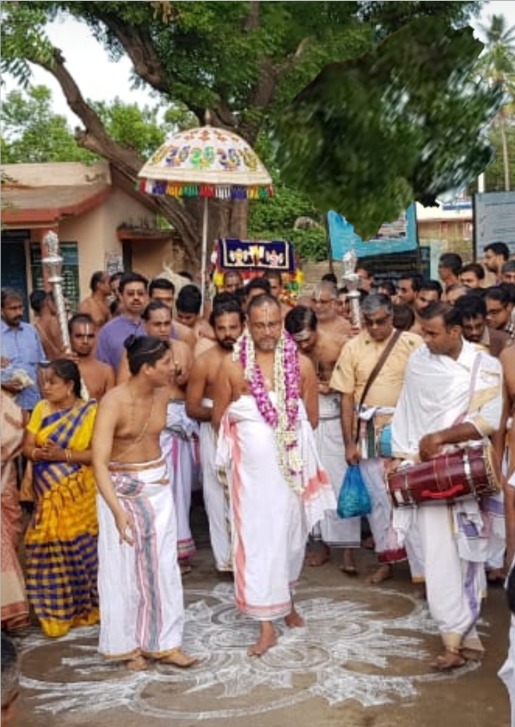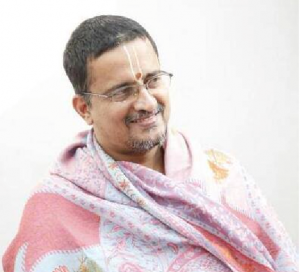In Srimad Bhagavatam, Sri Shuka extols the extraordinary glories of Bhagavan. King Parikshit’s very first questions paved the way for this -“What is to be listened to? What is to be chanted? What is to be remembered? What is to be seen? What is to be done? What is to be avoided?” Sri Shuka himself celebrates these questions of Parikshit.
Sri Swamiji says that it was the king’s lovely questioning that was the main cause for the wonderful answers given by Sri Shuka.
A devotee from Indonesia posed a beautiful question to Sri Swamiji, for which, Sri Swamiji too gave a wonderful answer:
“Sri Swamiji, I have heard it said – ‘Learn to live with a feeling that I’m dead, in order to be in the state of Happiness’ – What is the true meaning of this?”
Sri Swamiji joyfully started to reply.
 “Many such philosophical sayings exist in Vedanta. In Tamil Vedanta, there is a saying, ‘Neethaarai pol thiri’ (Wander like the dead). ‘Neethar’ means the dead ones. ‘Thiri’ means to roam about in this world.
“Many such philosophical sayings exist in Vedanta. In Tamil Vedanta, there is a saying, ‘Neethaarai pol thiri’ (Wander like the dead). ‘Neethar’ means the dead ones. ‘Thiri’ means to roam about in this world.
“What worldly events bother you? What kind of problems affect you? Right from the time you wake up in the morning, the news in the TV and newspapers or the day to day issues in the family, all of these create either happiness or worry. In this situation, consider yourself to be dead. If I’m dead, will any of the above issues disturb me? What kind of effects will these have on me?
“Suppose a dear friend or a relative had passed away 2-3 days ago or 1-6 months ago. What effect can the news that we see on television or newspaper or the worldly happenings have on a person who is already dead? Nothing, right? Why? They don’t exist to notice or to even lend their ears to it. Assume that ‘I too am in that state.’ Think that ‘I am a dead person with respect to worldly happenings.’ To that extent we should remain unaffected by such happenings.
“All that happens in the body or in our surroundings, kindle the emotions. The mind gets affected by such feelings. Hence the emotions need to be controlled.
“We worship Lord Sri Krishna. Sri Krishna is the greatest of all jnanis and a great yogi. He remains impervious to anything. By worshipping Him, we too shall attain a state of remaining unaffected by anything. That is the purpose of upasana. To become like Krishna does not mean getting a similar form like Him with peacock feather, peetambara or vaijayanthi mala.
“It means remaining unaffected by external circumstances. It is a state when one stays unperturbed – as a lifeless body would, under that circumstance. Eating to live and performing actions that are essential to sustain life helps in controlling our senses. Controlling the senses will in turn help in controlling the mind.
“When one cottage, in a cluster of cottages, catches fire, the flame engulfs all of them eventually. On the other hand, when a lone cottage catches fire, the fire dies down in a while as it has nowhere to spread and explode in size. The human mind behaves similarly. The mind vacillates from one thought to another as long as it has something to mull over. If the mind has nothing to dwell or fixate on, then it automatically comes under control. Bhakti is when the mind is focused only on God.
“It is impractical to expect the mind to be devoid of any thoughts. Instead, if the senses are trained to indulge in activities related to God, the mind will eventually come under control. If you want to ‘see’ something, then absorb the form of Krishna; if you want to ‘hear’ something, then listen to Srimad Bhagavatam; if you want to ‘say’ something then chant Nama; if you want to ‘go’ somewhere, then go on a pilgrimage.
“One of my favorite topics in Srimad Bhagavatam is Sri Shuka’s Bhikshu Gita. Being raised in a family deeply rooted in faith for generations, you have visited temples countless times since birth, undergone numerous fasts, performed japa, undertaken pilgrimages to holy rivers like Ganga, Kaveri, etc. What is the proof that you have benefited from all your spiritual practices?
“Bhikshu Gita says, if you want to measure your progress, check if your mind is one-pointed – sarvE mano nigrah lakshaNAntah. If your mind is not one-pointed, then it proves that your actions were half-hearted and done lightly without a serious commitment. Just as fire burns when touched, if your practices are performed with sincerity and commitment, the results are certain.
“A question arises – Can we keep count of the number of Namas chanted and resolve to chant 100, 1000 or 10,000 Namas a day? Instead of tallying, let us resolve to chant Nama till Lord Krishna appears at least in our dreams. With this objective in mind, we can motivate ourselves to be focused in our action and honor our commitment to our practice.
“‘Wander like the dead’ – I have long been dead; it is just the body that exists in this world. Practice this wholeheartedly, controlling the sense attachments to each and every action.
“Our feelings towards objects and people are central to all our problems. Simply put, man is nothing but a heap of feelings, good and bad.”
The devotee who raised this question offered his salutations to Sri Swamiji with tear-filled eyes and said that he had never heard such a profound explanation to this Tamil Vedantic saying ever in his life.
By Sri Ramanujamji
Reprinted from English MadhuraMurali monthly magazine
March 2018 and April 2018 issues





